“Wow! That’s a big bear,” I exclaimed as I pulled the truck off the road.
As I brought the pickup to a halt, my wife was quickly scanning the nearby woods, “Where?”
I pointed at the 2 o’clock position from the windshield, “Down there, on the ground.”
As I opened my door and climbed out of the truck, I heard her make an excited religious reference – something about a divine deuce – and agree, “Wow – he is huge!”
Since we were in our pickup truck, I had my tripod lying in the bed, set to a good “getting started” height and ready to go. I just needed to attach my camera and lens to it, a task that only takes seconds thanks to the quick release clamp I’ve added to my Wimberley gimbal head (it’s a Really Right Stuff PG-CC)
Side Note – In the past, I kept the camera mounted to the tripod at all times, but the quick release clamp allows me to attach it so quickly that you can go ahead and call it instantaneous. So now I keep the D5 and 600mm F/4 in the front seat with me, along with the D850 and 300mm PF. And yes, my wife is a very patient woman.
As I rounded the front of the truck, gear at the ready, another smaller bear popped out from behind some nearby vegetation. It was a female and the situation left no doubt in my mind that the big guy was on a mission to maintain a plentiful bear population in Cade’s Cove.
Sadly, as is often the case in these situations, there simply wasn’t a shot to be had of either bear. Too many obstacles between the lens and the bruins.
A few moments later, the situation changed – as it usually does with bears. In fact, one thing I’ve discovered over the years is that if you stick with a bear long enough, you’re bound to get a good shot. However, patience is the key – both yours and theirs. And a little luck doesn’t hurt either.
As if she heard my under-the-breath lamentations about not having a clear shot, she decided to head out in the open and amble towards the road, immediately crossing it. This was all the motivation the big guy needed and he followed closely behind. However, being no fan of photos featuring bears standing on asphalt, I was still no better off than I was a moment ago.
Since they were taking a track parallel to the road, I decided to stay with them – at a safe but still photographable distance. Although the big male was mostly obscured, the female teased me with a potential head-on shot as she dissected a log, but she never looked up. I find that’s the biggest challenge with black bears – they think with their stomachs, are at the top of the food chain, and see very little need to remove their nose from whatever log they’re probing to give any attention to a crazy guy with a camera making idiotic noises.
At this point, she decided to plunge deeper into the woods with the big guy leisurely pursuing from behind. Normally, this is the definition of a lost cause since black bears in the summer woods in the Smokies are always hidden by various branches, leaves, and twigs. Besides, you tend to lose visibility of your target in the thick brush – and when your target is one of the most massive black bears you’ve ever seen in the park, that’s a recipe for soiled undergarments.
However, I was in luck this time. The bears were angling towards a nearby service road that would offer a clear shot if the opportunity was right. I decided to head down and see if there was a location that would keep me a comfortable distance away while still affording a potential shot if they came out of the woods.
So, the situation was this. It was a cloudy day and the woods were dim enough to make you think it the sun had refused to break the horizon that morning, despite the fact it was over 90 minutes past sunrise.
My opportunities were very limited. The brush was thick and only a couple of locations offered clear views that would work for the shot I had in mind. Of course, my success was totally reliant on the bears emerging from one of these spots. As they drew closer, it became apparent which opening was going to give me a chance at a shot. I was reasonably confident the pair weren’t going to just force their way through some of the thicker stuff since they tend to take the most accessible path.
To get the anticipated eye-level shot, my tripod was set about a foot below my chin level. My D5 and 600mm F/4 were at the ready – the 600mm set wide open to F/4 to help with the dark conditions. Shutter speed was dropped all the way to 1/320th of a second – which still left me facing an ISO of 4500! VR was turned on and at the ready.
For this shot, I relied on Matrix metering. Although I know it can be argued (correctly) that spot metering can be more precise if appropriately managed, I find Matrix is usually close enough for RAW files in most situations. In this case, I only needed -1/3rd of a stop of exposure compensation, despite the preponderance of black fur in the image. Plus, I find Matrix faster to use in a rapidly developing scenario with varying light levels (although the light was overcast, it was not even – some areas were more protected and darker than others).
Focus, of course, was done with Back Button AF and in AF-C mode (you should always use AF-C when using BBAF). My AF area was just a single point that I would move over the bear’s eye – you know, if one of my targets ever decided to come into position.
The female wandered into the frame first and – unfortunately for me – made extraordinary good time over the downed logs and branches. She never once favored me with a glance in my direction.
However, and luckily, the big guy was another story.
As he had something other than food on his mind, he made his way across the log in a more casual style, taking his time but still refusing to look my direction. Sure I could have tried to make noise, clap, whistle, or any other common sound a human can make, but the thing is, these bears have heard ‘em all and summarily dismiss each and every noise I can conjure up. Besides, clapping or making too much noise would more than likely cause him to move off. Black bears tend to run first and ask questions later (although, I’m not 100% confident that rule applies to this massive fellow).
As he came into position, I was getting desperate. I decided that I’d go ahead and fire off a short burst and at least get a profile shot, plus, the shutter sound might get his attention. I’ve used that trick in the past and found that it sometimes works, although I know the odds are against it. Still, I have had luck with monkeys, deer, moose, elk, and even various species of birds with the technique, so, what’s to lose? You know, desperate times and all that.
So, I fired off a long burst as he walked into view with his head down. Well, that did it! The sound of the shutter was enough to pique his curiosity and he brought his massive bulk to a stop, lifted his head, and stared right down the lens barrel! I think he’s even smiling (or salivating, I’ll let you decide).
Salivating or smiling?
As a side note, I often find it interesting when I hear people complain about shutter noise, partially with cameras like the Nikon D5 and Nikon D850. The truth is that yes, sometimes the shutter can startle wary subjects, but at other times it can be used to gain their attention. My technique is just as described above. Even when the target of my intentions isn’t looking towards me, I go ahead and fire off a burst to see what happens. This seems to work best with the D5 – I don’t think most animals are accustomed to hearing 12 FPS ripping off.
At any rate, encouraged by his curiosity, I continued shooting. However, the dim light and low contrast created a situation where I was less than confident about the quality of my AF lock. So, I used the techniques in this article just in case – particularly the focus and defocus trick. It worked perfectly!
In addition to doing the whole focus and refocus trick, I was also facing some pretty grim shutter speeds in the viewfinder. In a real-world situation, I don’t like to dip below 1/250th with my “big rig” if I can avoid it (even with a more or less static subject), and I was dropping pretty close to that speed at 1/320th. So, even had I not been acquiring and requiring AF locks, I still would have been bursting longer than usual to make sure I had a nice percentage of tack-sharp images. I describe this technique in more detail here.
Although I could swear the encounter lasted for at least five minutes, it was really over in less than 30 seconds. The big guy quickly grew bored of me and gave his full attention back to traipsing along behind his girlfriend. All in all, it was an interesting encounter and I look forward to photographing his progeny next spring!
~Steve
PS – If you enjoyed this post, I think you’ll REALLY like my e-books, Secrets To Stunning Wildlife Photography and Secrets To The Nikon Autofocus System. They’re filled with hundreds of pages of information just like this. Check ’em out – click here (hey, it’s free to look 🙂 )

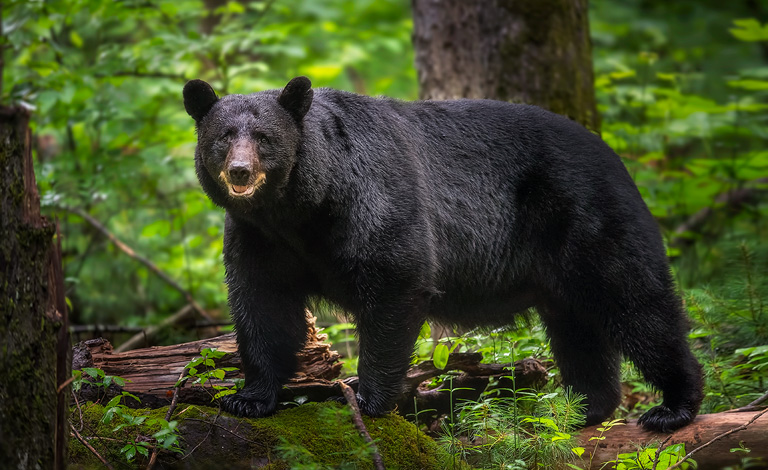
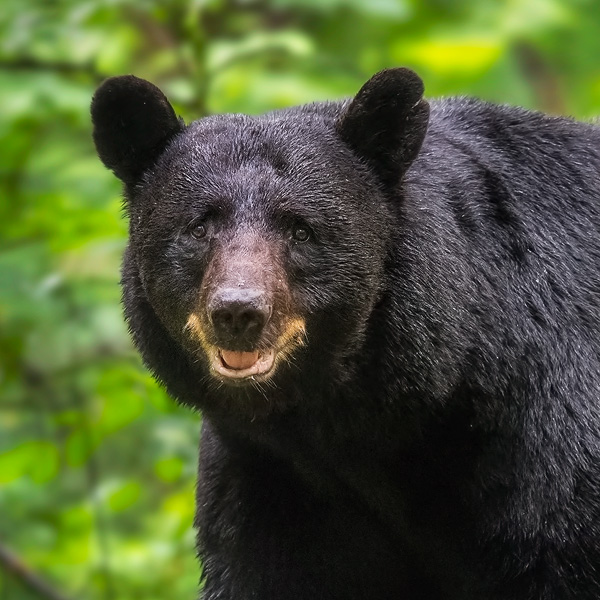
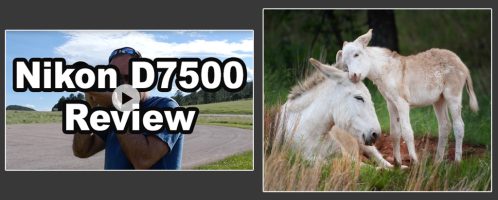
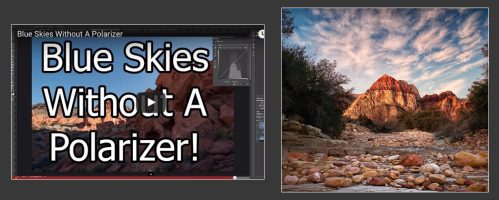
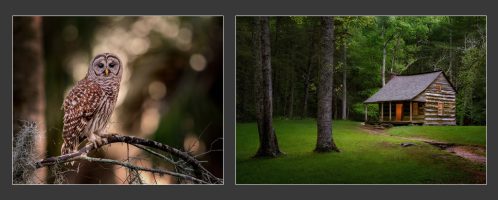
Amazing Story & tips. Thank you for Sharing. Photographing a bear is on my bucket list. Hopefully someday.
Amazing, post. Thank you for sharing. Photographing a bear is on my bucket list. I pray someday I can.
Great mini photo adventure.
Another enjoyable adventure story and most helpful shooting tips. This pearl ” I find Matrix faster to use in a rapidly developing scenario with varying light levels (although the light was overcast, it was not even – some areas were more protected and darker than others)” from this story answered a question I have been wondering about as I critique my birds in the trees images mostly shot with spot metering. I shoot with a D500 +300mmPF4+TC14 iii and every pearl counts and I have discovered the shutter noise helps more than hinders. Thank you. P.S. Smiling and Salivating.
Great story and interesting to hear what it took to get a shot like that. Although this may have been asked before, I’m curious to where you might sell or how you might use (other than on this blog) a shot like this. Thanks for any tips. As a fellow native of NorthWest Ohio (I’ve now live on the East Coast), I’ve learned a lot from your site.
For me, my business is education, so using it here on the blog, in books, or videos is all I require of it. I may sell it as a print down the road and it’s certainly available for editorial use. However, I don’t pursue editorial at the moment. I do get stuff published, but only because they come to me. Just recently on of my images was featured in Lake Superior Magazines 2019 calendar and a very popular photography magazine is putting publishing an article I wrote with a photo in October. So, when people want it, I sell it… Read more »
Great stuff, as always! Curious gear question… having had the D850 for a while now, what do you find yourself using the most these days? I believe in one of your early D850 videos, you mentioned the D5 might be on its way to collecting dust.
Thanks for the great content!
I still use the D5 – the one I don’t use much anymore is the D500. The gripped D850 sort of has one built in. I use the D5 for scenarios like what I had with the bear – dim, tough conditions that demand higher ISOs. I tend to use the D5 far more in the Costa Rica rainforests as well. However, when I have good light, the D850 gets the call more often than not. Last time I was in FL, I shot for nearly a month and never once used the D5 – it was D850 all the… Read more »
Thanks for the quick reply Steve. Decisions!
I’m not a fan of making noise to get an animal’s attention, but unavoidable when using a typical DSLR within the range of the animal’s hearing. Nice photo.
My Dear Steve..Thank you very much for the Sending…A very nice wildlife encounter..Again learning a lot for my Wildlife Photography works. Thank you very much. Best Regards to do more fruitful works like this..I am always following your Good Self.
Thank you again Steve for another terrific story of your encounters with wildlife. Every time I read your articles I take away another gem of wisdom. I’m hoping to take a trip to Africa next year with my girlfriend, and your advice, tips and tricks will be very much employed. It will feel as if you’re with me on that trip – your ebooks are always in my phone.
Cheers from Australia. Terry
Looks as if he has eaten some lemon custard, great shot.
Beautiful image
Magnificent shot Steve. What physical distance do you get to bears to ensure safety?
Depends on the bear and its demeanor. This guy was willing to maintain eye contact, so I kept back further than I would from a more submissive bear. There’s really no “perfect” fixed distance.
Thank’s Steve for this very interesting report; on your advice, my wife and me were at Cades’ Cove last spring and we were very Lucky not to encounter such a big guy..the Reason: we rode a bicycle on the loop.( However, I made some shots of a female with three one year cubs and it made my day!). Thank’s again!
Thanks I REALLY DO ENJOY your pics and descriptions – at age 83 the chances of me going out like that are about -zero.
A good well written and very interesting report, makes people realise how interesting photography can be……..AND….appreciate a cracking photograph, love it (with a smile)
x
A curious smile, wondering about that strange ape creature making odd noises. 🙂 Thanks, Steve.
Great story Steve. He’s smiling, and thinking you look tasty.
Fun article, thanks. It’s like I’m right there with you.
This was so brilliantly written! I enjoyed your journey and your photo from a very safe distance. 🙂
Hi Steve: I really enjoyed meeting you and your wife at Cade’s Cove. I have learned a lot from you through your videos and articles. I came home with lots of great pictures and will be headed back in early October.
The road side chat with you and your wife is one of the highlights of my trip. I live in South Florida and am out photographing wildlife several days a week. If I can every help you with what’s happening around here let me know.
Regards,
Jack Haxby
Hi Jack – The pleasure was all mine 😀
Were you bear hunting or was this encounter just dumb luck helped by that fact you were in a National Park?
Specifically looking for bear.
Marvelous bear pics! The HIGtS story provides great insight into what we see. Thanks for sharing that too.
Really enjoyed the image and description…clearly though, he is smiling, because he is thinking “Hmmmm, sex and human food….what more could I want?” Well done and thanks for sharing!
LOL 🙂
What did you consider was a “safe but photographable distance”?
A distance that keeps enough of the bear in the frame for a good shot but far enough back not to interfere with or encroach on him. Big glass is the key 🙂
Great shot.
You mention that VR is on. Doesn’t Nikon recommend that it be off when using a tripod?
It’s fine on a loose gimbal head for this lens. Each lens is different, and you have to check the instruction manual. One size does not fit all in this case.
If I knew beforehand that I would be in the woods close to “the big guy” I would have added one more item to my clothing….a diaper….
Great shot and a great analysis.
Great story and photos – thank you for sharing. You have a talent for photography and are very good at explaining how to get the shot.
Great patience, great anticipation and a great result! Congratulations Steve! And that divine duece reference……..hilarious!!
Thanks – my wife told me not to put it in, but (as she can attest), I seldom listen 🙂
BEAUTIFUL, he’s a big’un and congratulations Steve on the shot and also the compliments you’re receiving.
Great shot and a great article. This is a BIG bear and the focus it spot on.
Love the story behind the shot. Thanks for sharing and giving so many tips of wildlife photography!
I’m going with smiling!! I fully agree with Rodney, great catch!!
Great article, very nice shot well done. Always a pleasure to read your articles..
Very nice shot!